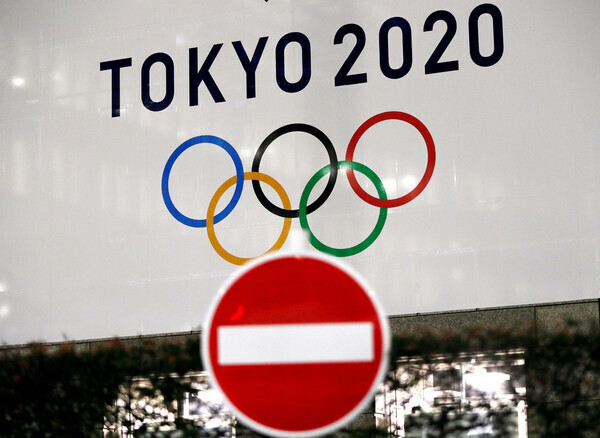hankyoreh
Links to other country sites 다른 나라 사이트 링크
[Column] Prioritizing profit over life, Tokyo Olympics are increasingly dangerous

As of Thursday, there were 57 days left until the Tokyo Olympics. The Tokyo 2020 Olympics have already been delayed by one year — a first in the Olympic Games history — and they’re now facing another crisis. With COVID-19 sweeping the world, the international festival of the Olympics has turned into a global headache.
At the moment, Japan is barely able to contain its COVID-19 outbreak. Ten areas in the country, including Tokyo, Osaka, and Hokkaido, are in an “emergency situation,” representing the toughest level of quarantine measures. Even so, Japan has been unable to stop the infection from spreading. Each day, it’s reporting 4,000-5,000 new cases.
90% of those new cases represent viral variants. Even more seriously, the number of patients in critical condition topped a thousand this month and has now reached 1,300, the largest number since the beginning of the pandemic. It’s becoming more common for more than a hundred deaths to be reported in a single day.
Each day, Japan’s hospitals face a desperate shortage of hospital beds and medical workers. Only 5.2% of the total population have received at least one dose of COVID-19 vaccine, just half of the global average of 9.9%. That’s the lowest level among member countries of the Organisation for Economic Cooperation and Development (OECD).
Amid these circumstances, it’s hardly surprising that 83% of Japanese who responded to a poll by the Asahi Shimbun newspaper were opposed to holding the Olympics and said that human lives be prioritized.
Experts think the Olympics could be deadly if held during the pandemic. At least 90,000 coaches and athletes from around the world would have to enter Japan for the Olympics. When volunteers are included, more than 100,000 people would be occupying the same space.
July and August, when the Olympics and Paralympics are scheduled to be held, are the hottest and muggiest time of the year in Tokyo. There are too many factors that complicate efforts to implement strict control measures. There are even concerns that the Olympics could become an incubator for the coronavirus.
Despite the surge of demand both inside and outside of Japan for the Olympics to be called off, the International Olympic Committee (IOC) and the Japanese government doggedly insist that the Olympics can be held safely.
“The Olympic steamroller rumbles forward. There are three main reasons: money, money, and money,” an Olympic scholar wrote in a guest essay for the New York Times.
The IOC is slated to make US$2.65 billion from the Tokyo Olympics for selling rights to broadcast the games, its primary source of income. NBC, the US broadcaster that holds the rights, would then profit immensely from advertising during the games.
If the Olympics are canceled, the IOC would lose income from selling the rights, while NBC would have to cough up the money it’s been paid for scheduled commercials.
Sources with the IOC have said the games will go ahead even if Japanese cities remain in an emergency situation, and even if the Japanese Prime Minister himself asks for a cancellation. Such remarks are extremely dangerous.
In an editorial, the Asahi Shimbun criticized the “IOC’s self-righteousness.”
The financial issue is also important for Japan. The question isn’t about how much money Japan can make, but how much it can reduce its losses.
Delaying the Olympics raised the cost of hosting the games to 1.64 trillion yen (US$14.96 billion). Holding a no-frills Olympics would leave Japan around US$900 million in the hole. Canceling them altogether would probably cost Japan US$3.7 billion in economic damage. The penalties that Japan would owe the IOC for backing out of the games are another wrinkle.
Another factor causing Japanese Prime Minister Yoshihide Suga to hesitate is the major political fallout his cabinet would face. If the Japanese government has to call off the Olympics because it failed to keep COVID-19 in check, Suga will likely be held to blame.
The situation in Japan forces us to confront the steadily growing precariousness of “mega events.” Our illusions about huge commercial events such as the Olympics and World Cup have been collapsing for some time now.
These events require huge budgets, but it’s unclear how much they actually benefit the host country’s image or economy. What is clear is that such events funnel money into international sporting organizations, the media and corporations.
These mega events are often used for political purposes, such as propping up regimes. The COVID-19 pandemic, in particular, is a vivid example of how dangerous the Olympics can be.
Nowadays, the Japanese are frequently asking who the Olympics are for. I think someone ought to answer that question.

By Kim So-youn, Tokyo correspondent
Please direct comments or questions to [english@hani.co.kr]

Editorial・opinion
![[Column] Park Geun-hye déjà vu in Yoon Suk-yeol [Column] Park Geun-hye déjà vu in Yoon Suk-yeol](https://flexible.img.hani.co.kr/flexible/normal/500/300/imgdb/original/2024/0424/651713945113788.jpg) [Column] Park Geun-hye déjà vu in Yoon Suk-yeol
[Column] Park Geun-hye déjà vu in Yoon Suk-yeol![[Editorial] New weight of N. Korea’s nuclear threats makes dialogue all the more urgent [Editorial] New weight of N. Korea’s nuclear threats makes dialogue all the more urgent](https://flexible.img.hani.co.kr/flexible/normal/500/300/imgdb/original/2024/0424/7317139454662664.jpg) [Editorial] New weight of N. Korea’s nuclear threats makes dialogue all the more urgent
[Editorial] New weight of N. Korea’s nuclear threats makes dialogue all the more urgent- [Guest essay] The real reason Korea’s new right wants to dub Rhee a founding father
- [Column] ‘Choson’: Is it time we start referring to N. Korea in its own terms?
- [Editorial] Japan’s rewriting of history with Korea has gone too far
- [Column] The president’s questionable capacity for dialogue
- [Column] Are chaebol firms just pizza pies for families to divvy up as they please?
- [Column] Has Korea, too, crossed the Rubicon on China?
- [Correspondent’s column] In Japan’s alliance with US, echoes of its past alliances with UK
- [Editorial] Does Yoon think the Korean public is wrong?
Most viewed articles
- 1[Column] Park Geun-hye déjà vu in Yoon Suk-yeol
- 2Thursday to mark start of resignations by senior doctors amid standoff with government
- 3Will NewJeans end up collateral damage in internal feud at K-pop juggernaut Hybe?
- 4[Guest essay] The real reason Korea’s new right wants to dub Rhee a founding father
- 5Why Korea shouldn’t welcome Japan’s newly beefed up defense cooperation with US
- 6[Editorial] New weight of N. Korea’s nuclear threats makes dialogue all the more urgent
- 7Kim Jong-un expressed ‘satisfaction’ with nuclear counterstrike drill directed at South
- 8[Column] ‘Choson’: Is it time we start referring to N. Korea in its own terms?
- 9N. Korean hackers breached 10 defense contractors in South for months, police say
- 10‘We must say no’: Seoul defense chief on Korean, USFK involvement in hypothetical Taiwan crisis